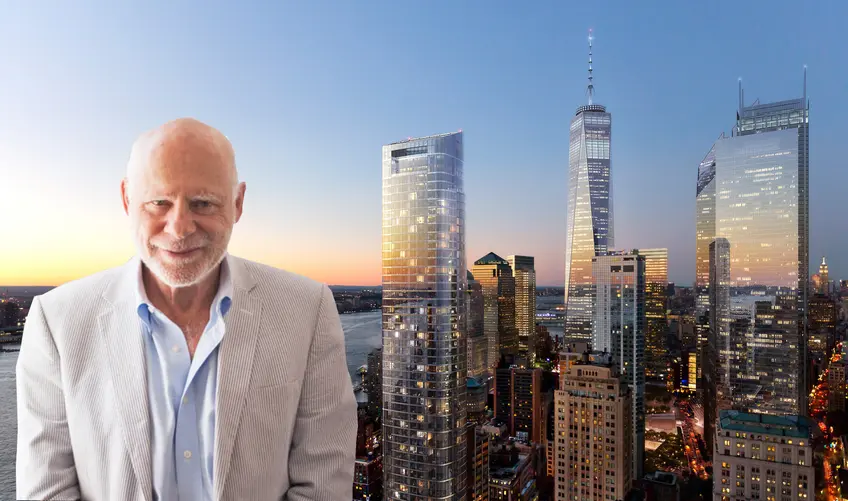 Time Equities, Inc. Chairman and Founder Francis Greenburger and a rendering of FiDi's 50 West Street (DBOX)
Time Equities, Inc. Chairman and Founder Francis Greenburger and a rendering of FiDi's 50 West Street (DBOX)
Led and founded by Francis Greenburger, Time Equities, Inc. maintains a portfolio of 33.6 million square feet of real estate holdings worldwide that includes over 5,000 multi-family apartments. Founded in 1966, the firm spearheaded the conversion of more than 10,000 rental apartments into co-op and condominium units. Salient undertakings include the repositioning of Tudor City and Clinton Hill Apartments into cooperative complexes.
In more recent years, the New York-based firm dipped its toes into the city's once-seemingly limitless high-end residential market. In 2013, working in partnership with Hamlin Ventures, the firm delivered the quick-to-sell 14 Townhouses in Boerum Hill, and in 2016, brought to market the svelte and shimmering 191-condo 50 West Street near the southwest tip of Manhattan.
The New York-based firm's latest-to-finish luxury venture is the condo conversion of the St. Patrick’s Old Cathedral School buildings at 34 Prince Street. Originally constructed in 1835, the landmarked orphanage-turned-school (of which Martin Scorsese was a student) has been reconfigured into nine graciously-sized residences. The team reports that the development's last sponsor unit, a five-bedroom with a sticker price of $10.7M, now has an accepted offer. We caught up with Mr. Greenburger to briefly discuss his most recent endeavors and broach the unfolding concerns affecting the local real estate market and the future of New York City overall.
In more recent years, the New York-based firm dipped its toes into the city's once-seemingly limitless high-end residential market. In 2013, working in partnership with Hamlin Ventures, the firm delivered the quick-to-sell 14 Townhouses in Boerum Hill, and in 2016, brought to market the svelte and shimmering 191-condo 50 West Street near the southwest tip of Manhattan.
The New York-based firm's latest-to-finish luxury venture is the condo conversion of the St. Patrick’s Old Cathedral School buildings at 34 Prince Street. Originally constructed in 1835, the landmarked orphanage-turned-school (of which Martin Scorsese was a student) has been reconfigured into nine graciously-sized residences. The team reports that the development's last sponsor unit, a five-bedroom with a sticker price of $10.7M, now has an accepted offer. We caught up with Mr. Greenburger to briefly discuss his most recent endeavors and broach the unfolding concerns affecting the local real estate market and the future of New York City overall.
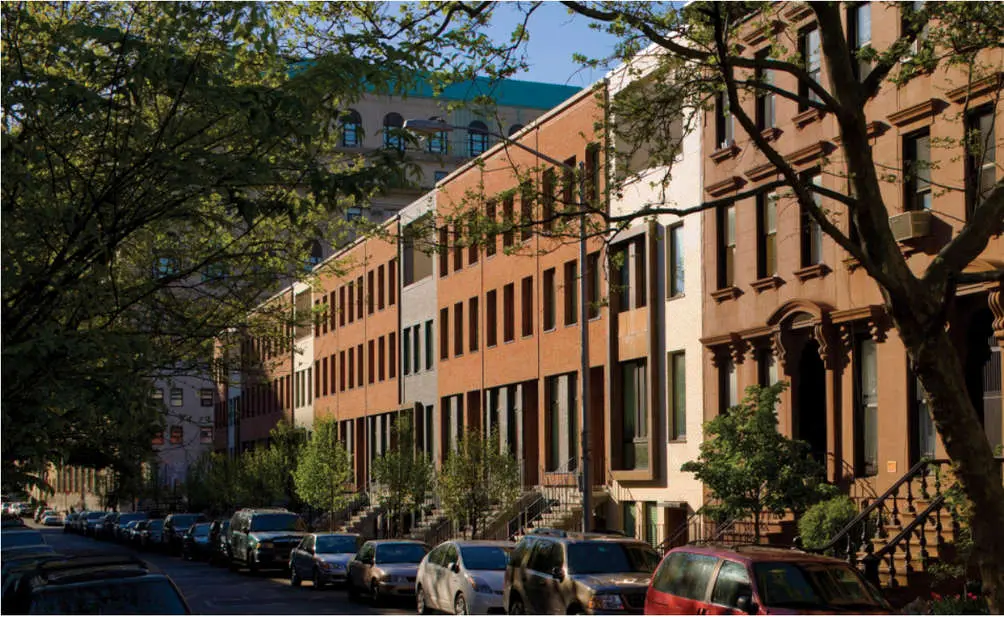 (Rogers Marvel Architects)
(Rogers Marvel Architects)
You were most recently behind The Residences at Prince Street and 50 West in Lower Manhattan. As many potential buyers sit on their hands due to an abundance of economic/political certainty throughout all levels of government, do you have any predictions on the direction of the Manhattan sales market?
Many new construction projects are having trouble attracting buyers at the moment, but the middle market had a surge in January. We had offers for half of the one-off units we had available in our portfolio - “unsold shares” in a wide selection of buildings and locations. We also accepted an offer for our last available unit at the Residences at Prince Street. As this demonstrates, the condo market can surprise us when we least expect it. The reality is that interest rates are very low, rentals are very high and condo pricing has moderated. I think parts of the market are waking up and seeing this as an opportune moment to buy.
"The reality is that interest rates are very low, rentals are very high and condo pricing has moderated." - Francis Greenburger, CEO and Founder at Time Equities
How did you come about choosing Helmut Jahn for 50 West?
We held a competition. I, and my colleagues at TEI, were most convinced by Helmut’s response and conceptual design although we had other very strong firms participating.What is your favorite neighborhood in NYC? If you were looking to build a new condo development, what area(s) do you see the most potential?
My favorite neighborhood is Greenwich Village, where I own a townhouse near Washington Square. But I am not looking to invest in New York City at the moment. Anti-real estate legislation is eroding developer confidence in NYC and will further cause investors and financing institutions to shift their focus outside of NYC and towards secondary and tertiary cities.
What are some of the biggest problems facing New York City in the next decade? Next 50 years?
It’s the high-tax, anti-business, and anti-real estate political attitude. New York needs its business base to support its admirable social priorities but our legislators do not seem to see the connection. Like many coastal cities, New York is confronting climate change and rising sea levels. The government is thinking about ways to make New York sustainable. There are parts of Manhattan that are more vulnerable than others. Individual buildings are being retrofitted to withstand future flooding, especially in Lower Manhattan.
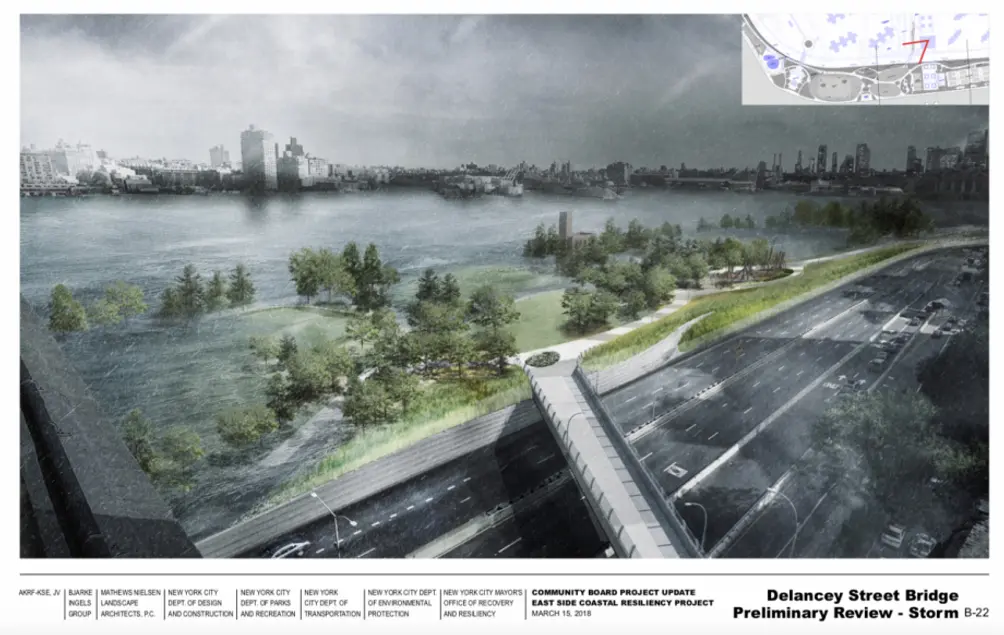 Credit: The Mayor's Office of Recovery and Resiliency
Credit: The Mayor's Office of Recovery and Resiliency
The census estimates that the state and city have been losing residents for the past several years, and a recent study reported that Millennials are among the fastest-growing group to ditch the Big Apple. Any thoughts on this and how can the city remain attractive to Generation X?
Different generations have different priorities. Millennials are drawn to the urban areas where they see economic opportunities, are user-friendly, have quality housing and education, and are near cultural institutions. New York City must be conscious of providing these resources, including attractive housing and a supportive business environment. Recent rent law changes are lowering the quality of available housing and will discourage millennials from locating here. Secondary and tertiary cities are growing their resources and competing with the larger urban areas. Ultimately, members of Generation X want to live-work-play in less stressful environments, such as smaller cities and suburbs, that are child-friendly.
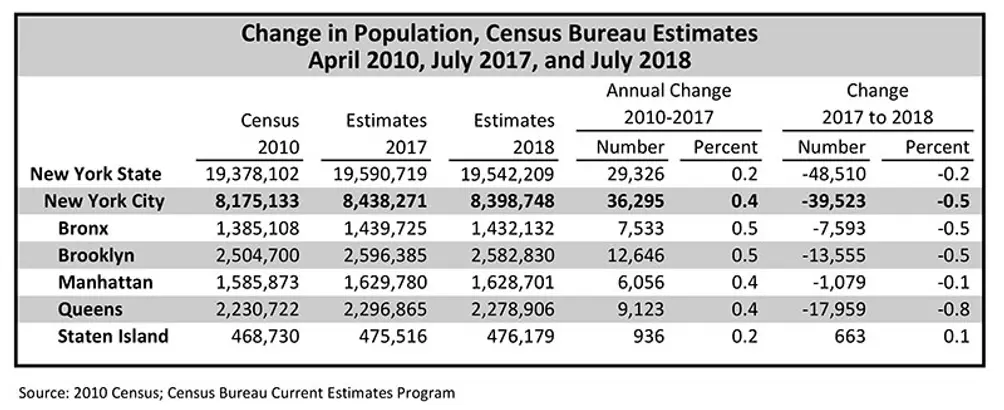 In 2019, the Census Bureau estimated that NYC had a net decline of nearly 50,000 residents between 2017 and 2018
In 2019, the Census Bureau estimated that NYC had a net decline of nearly 50,000 residents between 2017 and 2018
Comptroller and possible mayoral candidate Scott Stringer recently proposed a "Universal Affordable Housing" plan that would do away with the 421-A tax abatement and require all projects of more than 10 units to set aside 25 percent of apartments as affordable. What would be the repercussions of such a plan?
This will drastically reduce high-quality housing from being developed in NYC and further alienate the skilled workers that NYC businesses need to succeed.
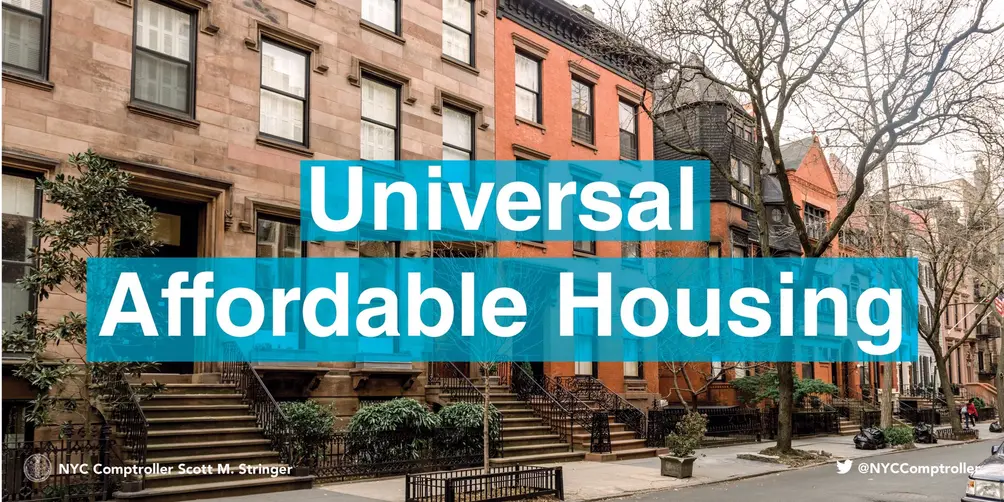 via Scott Stringer Twitter @NYCComptroller
via Scott Stringer Twitter @NYCComptroller
Congestion pricing may come into effect for lower Manhattan in 2021 (Trump-willing). Any opinion on this and the city's various transportation issues in general?
I think the city is doing a strong job in making the streetscape more user-friendly through innovating and encouraging alternative modes of transportation. Mass transit is at the heart of city life and our city’s mass transit system needs to be urgently improved. Congestion pricing will help the flow of traffic as commuters are encouraged to consider alternatives to driving into the city.

New Developments Editor
Ondel Hylton
Ondel is a lifelong New Yorker and comprehensive assessor of the city's dynamic urban landscape.

 6sqft delivers the latest on real estate, architecture, and design, straight from New York City.
6sqft delivers the latest on real estate, architecture, and design, straight from New York City.
